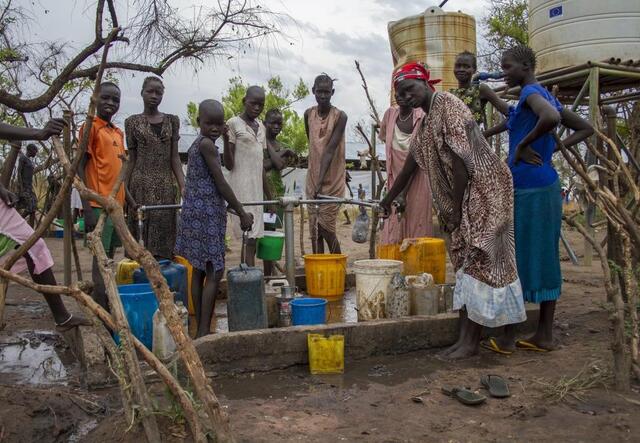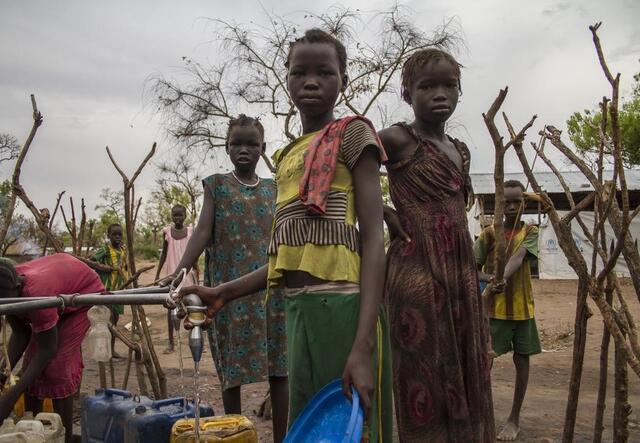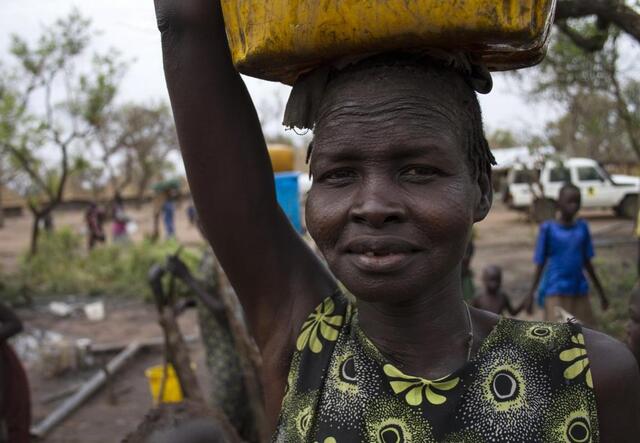
Turning on the tap this morning to brush your teeth, did you think about the clean water coming straight from your tap as a luxury? Why should you? Access to clean water is a basic need.
For 663 million people, nearly a tenth of the global population, access to clean water is still a luxury they don’t have. For many, conflict and war have destroyed the vital infrastructure needed to bring water to communities and refugee camps, whilst climate change and drought continue to place increasing strain on limited resources.

Since violence erupted in the world’s newest nation, South Sudan, in December 2013, 283,000 people have fled across the border to Ethiopia. Already home to a quarter of a million Somali refugees, the country’s infrastructure, damaged by repeated droughts and periods of food-insecurity, struggled to cope. Throughout 2015 the refugee population of Ethiopia continued to swell, and in August a new refugee camp, Fugnido II, opened in Gambella Regional State to provide a home to 16,000 South Sudanese.
The International Rescue Committee has been working in the camp since it opened; ensuring that refugees have access to safe, clean drinking water. Within two months of the camp opening, the IRC had drilled boreholes and built 22 tap stands throughout the camp, enabling refugees to access clean water close to their homes.
For people living in Fugnido II camp these tap stands provide a vital lifeline, and help to prevent outbreak of diseases such as acute watery diarrhea. Nyajamma Gonge is 12 years old and fled fighting in South Sudan in August along with her mother and brother. While her mother goes to the food distribution centre, Nyajamma collects water for the family. Nyajamma explains, “I am happy that we can get water here in our block [of the camp]”. Nyajamma goes to school in the camp, she is in Grade 3 and is happy to be continuing her education in Ethiopia.
A healthy community
In addition to installing the water system, the IRC has worked alongside the community in Fugnido II camp to ensure hygiene and sanitation facilities are available in the new camp. Within the first month of the camp opening, the IRC constructed 200 community latrines to meet the refugees’ immediate needs, keeping the camp clean and free from disease. Since then, families have been supported to build their own latrines and shower facilities using locally available materials. Through Community Health Club activities, the IRC has trained members of the refugee community to act as ‘Environmental Health Agents’ within the camp. These agents distribute hygiene-enabling materials, make house-to-house visits to monitor hygiene practices, and organize community discussions on hygiene issues including hand-washing, water storage, and waste management.

Nykuet Routh lives in Fugnido II with her seven children, having also fled South Sudan in the summer of 2015. Her husband remains in South Sudan. To support her family, Nykuet works part-time with the IRC as a Latrine Attendant, using this income to help support her children to attend primary school. Thanks to the IRC and the work of refugees like Nykuet, the camp is a healthy and safe place to live.
In partnership with the European Commission's Humanitarian aid and Civil Protection department (ECHO), the IRC was able to respond rapidly to meet the water and sanitation needs of refugees in Fugnido II camp. As in other camps in Ethiopia, ECHO’s support allows the IRC to construct much needed Water, Sanitation and Hygiene infrastructure to meet urgent needs quickly and effectively. Ongoing operation and maintenance of the water supply systems is also supported by the United Nations High Commissioner for Refugees.
In addition to supporting refugee water, sanitation, and hygiene work, ECHO provides funding for the IRC’s Emergency Response Mechanism in Ethiopia. This mechanism allows the IRC and its partners to carry out life-saving WASH, health and nutrition responses to rapid onset emergencies such as drought, flooding, disease and displacement due to conflict.